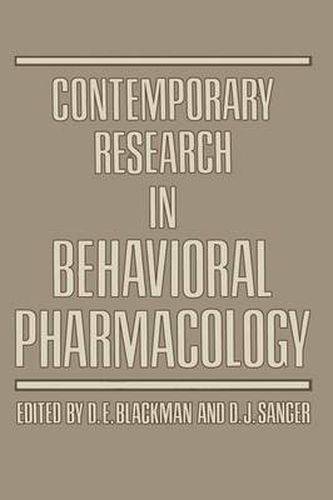Readings Newsletter
Become a Readings Member to make your shopping experience even easier.
Sign in or sign up for free!
You’re not far away from qualifying for FREE standard shipping within Australia
You’ve qualified for FREE standard shipping within Australia
The cart is loading…






This title is printed to order. This book may have been self-published. If so, we cannot guarantee the quality of the content. In the main most books will have gone through the editing process however some may not. We therefore suggest that you be aware of this before ordering this book. If in doubt check either the author or publisher’s details as we are unable to accept any returns unless they are faulty. Please contact us if you have any questions.
The effects of drugs on behavior are of inherent interest and psycho- pharmacology has provided a focus for research activity for many years. Until recently, however, it could be claimed that the contribution of pharmacology was more obvious than that of psychology in the de- velopment of what should surely prove to be a matter for interdis- ciplinary endeavor. Pharmacological analyses of drug action have frequently been expressed in terms of dose-response functions, for ex- ample, with the dependent variable taking the form of patterns of be- havior whose controlling influences were but poorly understood. The introduction of operant conditioning techniques has transformed psy- chopharmacology in this respect. Operant analyses have traditionally emphasized the environmental determinants of behavior and have ex- plored the behavioral outcomes of many different experimental ar- rangements. These different behavioral repertoires have quickly proved to be of great importance in influencing the behavioral effects of drugs, and so psychologists have begun to playa role which better balances that of the pharmacologist in experimental psychophar- macology. To reflect the development of these interdisciplinary studies, several excellent books have been published in recent years. These 1 have included introductory texts, collections of important experi- mental reports which had appeared in learnedjournals,2 and authorita- 3 tive handbooks which survey the current scene.
$9.00 standard shipping within Australia
FREE standard shipping within Australia for orders over $100.00
Express & International shipping calculated at checkout
This title is printed to order. This book may have been self-published. If so, we cannot guarantee the quality of the content. In the main most books will have gone through the editing process however some may not. We therefore suggest that you be aware of this before ordering this book. If in doubt check either the author or publisher’s details as we are unable to accept any returns unless they are faulty. Please contact us if you have any questions.
The effects of drugs on behavior are of inherent interest and psycho- pharmacology has provided a focus for research activity for many years. Until recently, however, it could be claimed that the contribution of pharmacology was more obvious than that of psychology in the de- velopment of what should surely prove to be a matter for interdis- ciplinary endeavor. Pharmacological analyses of drug action have frequently been expressed in terms of dose-response functions, for ex- ample, with the dependent variable taking the form of patterns of be- havior whose controlling influences were but poorly understood. The introduction of operant conditioning techniques has transformed psy- chopharmacology in this respect. Operant analyses have traditionally emphasized the environmental determinants of behavior and have ex- plored the behavioral outcomes of many different experimental ar- rangements. These different behavioral repertoires have quickly proved to be of great importance in influencing the behavioral effects of drugs, and so psychologists have begun to playa role which better balances that of the pharmacologist in experimental psychophar- macology. To reflect the development of these interdisciplinary studies, several excellent books have been published in recent years. These 1 have included introductory texts, collections of important experi- mental reports which had appeared in learnedjournals,2 and authorita- 3 tive handbooks which survey the current scene.